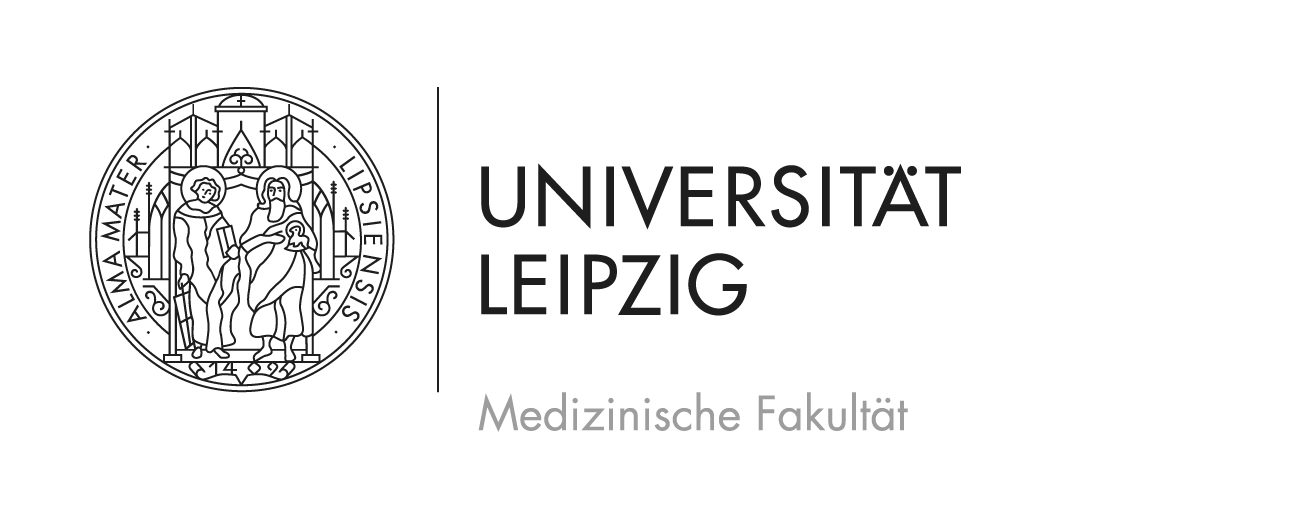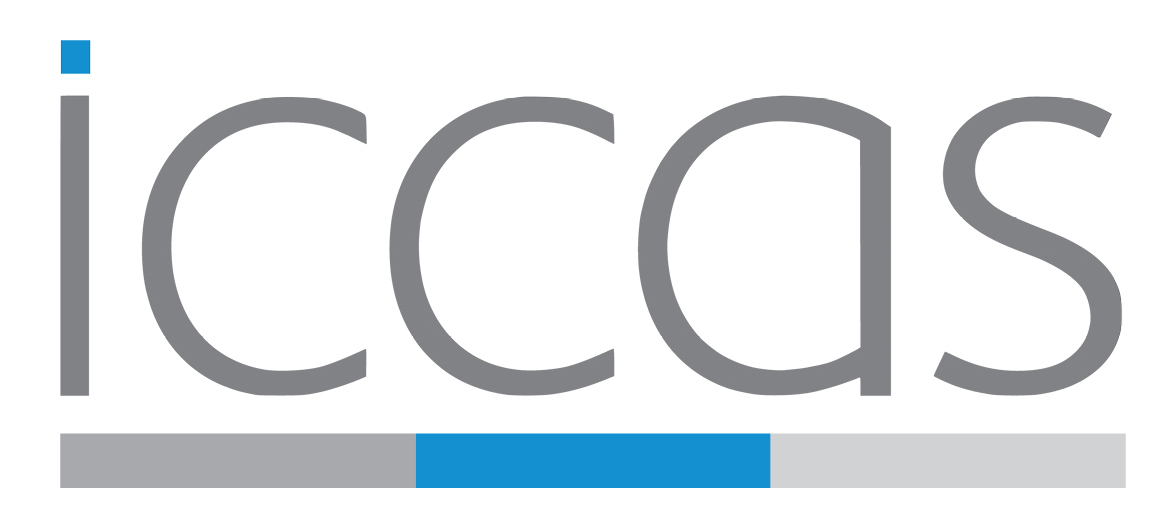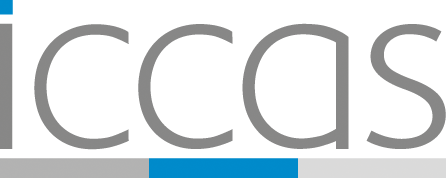14.11.2012
 ICCAS Kolloquium – 9. November 2012
ICCAS Kolloquium – 9. November 2012
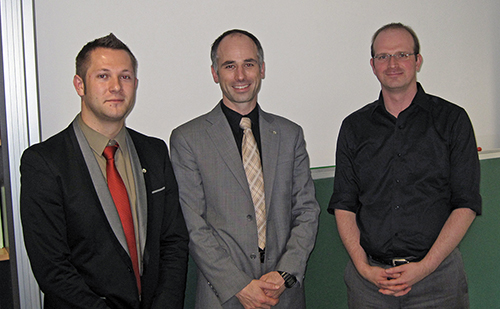
Im Zuge des ICCAS Kolloquiums am 9. November 2012 sprachen in Leipzig Herr Dr. Leiber und Dipl.-Ing Daniel Schubert – beide von der Technischen Universität Chemnitz, Fakultät für Maschinenbau – zum Thema „Einfach sicher – Usability in der Medizintechnik“. Herr Dr. Leiber ging zunächst allgemein auf die “Usability” ein und stellte anschließend einen Bezug zur Medizintechnik her. Danach übernahm Herr Schubert das Wort und präsentierte die Forschungsinhalte seines Projektes zur Ergonomischen Produktgestaltung.
 In the course of the ICCAS colloquium on 9 November 2012 in Leipzig Dr. Leiber and engineer Daniel Schubert – both from the Technical University of Chemnitz, Department of Mechanical Engineering – gave a lecture on the issue “Simple and Safe – Usability in Medical Technology”. Firstly Dr. Leiber gave detailed information about the usability and following produced a reference to medical technology thereafter Dipl. – Ing. Schubert presented the content of his research project “Ergonomic design of products”.
In the course of the ICCAS colloquium on 9 November 2012 in Leipzig Dr. Leiber and engineer Daniel Schubert – both from the Technical University of Chemnitz, Department of Mechanical Engineering – gave a lecture on the issue “Simple and Safe – Usability in Medical Technology”. Firstly Dr. Leiber gave detailed information about the usability and following produced a reference to medical technology thereafter Dipl. – Ing. Schubert presented the content of his research project “Ergonomic design of products”.

08.11.2012
 Pressemitteilung: Erforschung von Patientensimulationsmodellen für die Chirurgie
Pressemitteilung: Erforschung von Patientensimulationsmodellen für die Chirurgie
Zum 1. November 2012 wurde die zweite gemeinsame Nachwuchsforschergruppe der Hochschule für Technik, Wirtschaft und Kultur Leipzig (HTWK Leipzig) und der Universität Leipzig bewilligt. Wissenschaftler – vier Ingenieure und vier Humanmediziner – bearbeiten konkrete Fragestellungen rund um die Erforschung intelligenter, chirurgischer Patientenmodelle der zweiten Generation und streben dabei ihre Promotion an. Das Projekt mit dem Namen “PascAL – Patientensimulationsmodelle für die chirurgische Ausbildung und Lehre” wird durch die HTWK Leipzig koordiniert und für zwei Jahre aus Mitteln des Europäischen Sozialfonds (ESF) und des Freistaates Sachsen in Höhe von insgesamt 1,435 Mio. Euro gefördert.
An dem Projekt beteiligt sind Nachwuchswissenschaftler der Forschergruppen ICCAS (Innovation Center Computer Assisted Surgery) der Medizinischen Fakultät der Universität Leipzig und ISTT (Innovative Surgical Training Technologies) der HTWK Leipzig. Beide Forschergruppen verfügen bereits über umfangreiche Erfahrungen auf dem Gebiet der chirurgischen Trainingsmodelle. Mit PascAL erhalten sie die Chance, solche Modelle in ihren Qualifizierungsarbeiten weiterzuentwickeln. Dadurch soll ein Beitrag geleistet werden, Trainingsmöglichkeiten zu verbessern und OP-Risiken weiter zu reduzieren. Die Wissenschaftler arbeiten meist in “wissenschaftlichen Tandems” – ein Arzt zusammen mit einem Ingenieur. Themen sind unter anderem die Entwicklung realistischer Patientenmodelle für Operationen an Herz, Halswirbelsäule und Nase.
Prof. Jürgen Meixensberger, Direktor der Universitätsneurochirurgie und ICCAS-Sprecher, erklärt: “Nehmen wir das Beispiel Bandscheibenvorfall. An einem Modellstück der Halswirbelsäule kann der Eingriff mit allen Komplikationsmöglichkeiten realitätsgetreu nachvollzogen werden. Derartige Trainingsmöglichkeiten fördern in Zeiten zunehmender technischer Komplexität die Sicherheit des Operateurs und kommen somit den Patienten direkt zugute.”
Prof. Markus Krabbes, Prorektor für Wissenschaftsentwicklung der HTWK Leipzig, bestätigt: “Ein Simulationssystem ist ein großer Vorteil. Unsere Forscher haben das Know-How für deren Entwicklung: Mit naturgetreuer Haptik und Optik, aus realistisch anmutenden Materialien, mit integrierten Sensoren und mit einer elektronischen Steuerung für standardisierte Situationen bis hin zu eingebauten Fehlern und Stresssituationen – an einem echten Patienten völlig unmöglich trainierbar.” Ziel sei aber nicht, alle denkbaren Situationen bis ins Detail zu üben, sondern ein Fehlermanagementverhalten zu erlernen, um situationsadäquat reagieren zu können.
Hintergrund
Das ICCAS (Innovationszentrum Computer Assistierte Chirurgie) an der Medizinischen Fakultät der Universität Leipzig ist 2005 gestartet. In mehreren Nachwuchsforschergruppen wird fachübergreifend an der Entwicklung computergestützter Assistenzsysteme im Operationssaal geforscht. Das Projekt hat sich zu einem international wettbewerbsfähigen Wissenschaftszentrum entwickelt und strebt mit seinen Konzepten für den digitalen OP neue Maßstäbe für die Sicherheit von Chirurgen und Patienten an.
Die Forschungsgruppe ISTT (Innovative Surgical Training Technologies) am Forschungszentrum der HTWK Leipzig wurde 2010 gegründet. Hier arbeiten momentan 13 Mitarbeiter – Ingenieure, Psychologen, Designer und Betriebswirte – an der Entwicklung von chirurgischen Modellen und Trainings-Operationsräumen. Das Forschungszentrum der HTWK Leipzig erhielt 2012 den Preis “Ausgewählter Ort im Land der Ideen” des Wettbewerbs “Deutschland – Land der Ideen”.

17.10.2012
 Dr. Thomas Neumuth stellt Forschungsergebnisse auf der CET 2012 vor
Dr. Thomas Neumuth stellt Forschungsergebnisse auf der CET 2012 vor
In the upcoming week, Dr. Thomas Neumuth will present ICCAS research reports in the situation recognition in the operating room at the CET2012 (World Congress on Engineering and Technology 2012) in Beijing. His poster, entitled “Information Fusion for Acquisition Process in the Operating Room” will be presented in Applied and Engineering Mathematics (AEM).
On the CET2012 meeting, international scientists will discuss global developments and the latest research results in the fields of engineering and technology.

 Dr. Thomas Neumuth verteidigt seine Habilitationsschrift
Dr. Thomas Neumuth verteidigt seine Habilitationsschrift
On 16th of October Thomas Neumuth, Group Leader of the Research Group on May ICCAS, successfully defended his habilitation thesis “Surgical Process Modeling: Theory, Methods and Applications” to the Faculty Council of the Faculty of Medicine.

11.10.2012
 Leipziger Forum CAS
Leipziger Forum CAS
For this year’s Think Tank, which took place between the 8th and 10th of October, renowned scientists from all around the world traveled to Leipzig to advise on the latest research and developments in the field of computer assisted surgery. During the two-day program, the current research fields of ICCAS and future areas of scientific work in Leipzig were presented and discussed.

 Vortrag von Sandra von Sachsen auf der DGG
Vortrag von Sandra von Sachsen auf der DGG
Sandra von Sachsen gave a lecture on “model-based support for stent graft selection” at the 28th Annual Meeting of the German Society for Vascular Surgery (DGG), which took place between the third and the 6th of October 2012 in Wiesbaden. She presented research results for the development of an evaluation module for simulation results. This will allow a comparison between vascular prostheses and the patient-specific vessel.
The focus of the studies presented was the discussion and evaluation of the new planning method in collaboration with 15 vascular surgeons.
02.10.2012
 MICCAI 2012
MICCAI 2012
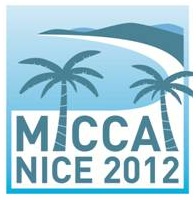 Dr. Thomas Neumuth, Stefan Bohn und Stefan Franke vertreten das ICCAS auf der diesjährigen “15th International Conference on Medical Image Computing and Computer Assisted Intervention (MICCAI)”, die vom 01. bis 05. Oktober in Nizza stattfindet.
Dr. Thomas Neumuth, Stefan Bohn und Stefan Franke vertreten das ICCAS auf der diesjährigen “15th International Conference on Medical Image Computing and Computer Assisted Intervention (MICCAI)”, die vom 01. bis 05. Oktober in Nizza stattfindet.
Dr. Thomas Neumuth vertritt das ICCAS als Mitglied des Program Committee. Weiterhin leitet er den “3rd Workshop on Modeling and Monitoring of Computer Assisted Interventions”. Dieser dritte Workshop zielt darauf ab, in dem bereits etablierten Forum, die Diskussion über die modernen Methoden zur Erfassung, Analyse, Modellierung und Überwachung von operative / interventionellen Verfahren weiter voranzutreiben.
Stefan Bohn übernimmt beim “Fifth International Workshop on Systems and Architectures for Computer Assisted Interventions (SACAI)” die Moderation einer Diskussionsrunde mit Teilnehmern der Medizintechnikindustrie zum Thema Interoperabilität in der Computer-assistierten Chirurgie. Ferner hält er einem Vortrag zum Thema “An integration architecture with centralized control for medical devices in the digital operating room.”
Stefan Franke stellte aktuelle Arbeiten des ICCAS zu Workflowmanagement im Operationssaal vor. Im Rahmen des Workshops “M2CAI 2012 – 3rd Workshop on Modeling and Monitoring of Computer Assisted Interventions” hält er einen Vortrag zum Thema “Prediction of remaining procedure time from current surgical activities”. Ziel der Arbeit ist die Entwicklung eines technischen Assistenzsystems zur Unterstützung des Zeit- und Ressourcenmanagements in modernen Operationssälen.
 Dr. Thomas Neumuth, Stefan Bohn and Stefan Franke will represent the ICCAS at this year’s “15th International Conference on Medical Image Computing and Computer Assisted Intervention (MICCAI)” from May 01 to 05 October in Nice.
Dr. Thomas Neumuth, Stefan Bohn and Stefan Franke will represent the ICCAS at this year’s “15th International Conference on Medical Image Computing and Computer Assisted Intervention (MICCAI)” from May 01 to 05 October in Nice.
Dr. Thomas Neumuth will represent the ICCAS as a member of the Program Committee. Furthermore he also directs the “3rd Workshop on Modeling and Monitoring of Computer Assisted Interventions”. This third workshop discusses the modern methods of collecting, analyzing, modeling and monitoring of surgical / interventional procedures within this well-established forum.
Stefan Bohn takes over at the “Fifth International Workshop on Systems and Architectures for Computer Assisted Interventions (SACAI)” moderating a roundtable discussion with members of the medical technology industry on interoperability in the computer-assisted surgery. He also holds a lecture entitled “An integration architecture with centralized control for medical devices in the digital operating room.”
Stefan Franke will present his latest works of ICCAS for workflow management in the operating room. At the workshop “M2CAI 2012 – 3rd Workshop on Modeling and Monitoring of Computer Assisted Interventions” he will give a presentation about “Prediction of remaining procedure time from current surgical activities”. The aim of the work is to develop a technical assistance system to support the time and resource management in modern operating rooms.

26.09.2012
 Stefan Bohn vertrat das ICCAS auf der SMIT 2012
Stefan Bohn vertrat das ICCAS auf der SMIT 2012
Stefan Bohn represented ICCAS at this year’s “24th International Conference of the Society for Medical Innovation and Technology (SMIT)”, from the 20th to 22 September in Barcelona. Stefan Bohn presented his Poster “A modular and open OR integration system and its application to neurosurgery.”
The aim of the work is to develop a modular operating integration architecture based on open standards that integrates medical devices from different manufacturers at the surgical workspace.

20.09.2012
 Vortrag von Sandra von Sachsen auf der GMDS 2012
Vortrag von Sandra von Sachsen auf der GMDS 2012
At this year’s 57th Annual Meeting of the German Society for Medical computer science, Biometry and Epidemiology, Sandra von Sachsen presented her research on the topic: “Continuous process chain for integration of a patient-specific finite element model in the EVAR-planning process.”. The aim of the present work is a quantitative evaluation of vascular prostheses that are intended to support the vascular surgeon perspective in the selection of optimal stent-grafts for treatment of abdominal aortic aneurysms. The corresponding abstract is available at: http://www.egms.de/static/de/meetings/gmds2012/12gmds017.shtml

06.09.2012
 OR.NET startet zum 01.09.2012
OR.NET startet zum 01.09.2012
01.09.2012 will be the start for the R & D major project “OR.NET” funded by the BMBF with a total of approx. 15 million euro, with a total of 41 partners and under the leadership of the University of Heidelberg, the technical University of Munich and the RWTH Aachen. The aim of the project is the design, evaluation and implementation of concepts for vendor-independent and dynamic networks for the often very innovative but also very different medical components into existing operating rooms and IT infrastructures with the aim of expanding the overall functionality.
ICCAS takes over in this project including a major role in the standardization of technical standards, processes and protocols that are important for the dynamic linking. With the establishment of a demonstrator, the exemplary implementation of a dynamic integration and networking will be tested and presented in an operating room environment.
